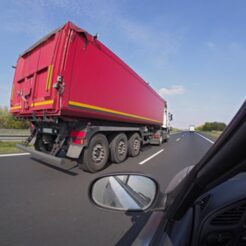Negligence of Trucking Companies in New York - we can help you with your case

Trucking accidents are different from passenger car crashes in many ways. It’s not just the size of the vehicles or the severity of the impacts. Taking on a large commercial trucking company in court can be very difficult and requires the help of a skilled attorney.
At Belluck & Fox, our respected New York truck accident lawyers have extensive experience successfully handling claims involving trucking company negligence. We have helped countless individuals and families recover maximum compensation after catastrophic truck crashes, and we stand ready to help you now. Contact us today to set up a free consultation.
Common Forms of Trucking Company Negligence
Table of Contents
- 1 Common Forms of Trucking Company Negligence
- 2 Truck Company Neglect: Hours of Service Violations
- 3 When Do Hours of Service Requirements Apply for Truck Company Neglect Claims?
- 4 Understanding How Hours of Service Really Work for Your Truck Company Negligence Case
- 4.1 How Violations Can Happen and the Trucking Company is at Fault for a Truck Accident
- 4.2 Hours of Service for Interstate Carriers: Trucking Company Negligence
- 4.3 Hours of Service for Intrastate Carriers: Truck Company Neglect
- 4.4 New York Intrastate Rules That Leads to Truck Company Negligence Cases
- 5 Truck Company Neglect: Lack of Training or Improper Training
- 6 Negligent Hiring: Truck Company Neglect
- 7 Failure to Perform Inspections: Truck Company Negligence
- 8 Our Attorneys Hold Negligent Drivers and Truck Companies Accountable
Take a drive on any New York highway or interstate, and you will immediately notice that there are many types of large commercial vehicles rushing to get to their destinations as fast as possible. Many interstates become log jammed by big rigs, charter busses, and other oversized vehicles.
With so many trucks on the road, it should come as no surprise that trucking companies face a lot of competition. With that competition comes a lot of incentive to cut corners on safety, training and other responsibilities that can result in added danger to the public.
Our law firm has handled a wide range of cases involving trucking company negligence, with some of the most common types involving:
-
Reckless driving
-
Hours of service violations
-
Lack of training or improper training
-
Negligent hiring
-
Failure to perform inspections
Truck Company Neglect: Hours of Service Violations
Commercial drivers must adhere to specific hours of service regulations. These are the permissible amount of time that a commercial driver can work or operate the vehicle within a given period. The Federal Motor Carrier Safety Administration strictly enforces these regulations through the requirement that truck drivers maintain logs.
Once upon a time, these were kept as paper journals of the driver’s work time and driving time. Today, most major trucking operations use some form of electronic log to ensure compliance. Of course, this does not mean all companies use them. Even those that do use electronic logs are susceptible to falsified logs or inaccurate reporting of time.
When Do Hours of Service Requirements Apply for Truck Company Neglect Claims?
All of the following circumstances require hours of service regulations to be met:
- The vehicle weighs 10,001 pounds or more or it has a gross combined weight of 10,001 pounds or more (when combined with a trailer or load).
- The vehicle carries hazardous materials in great enough quantities that it requires the use of HAZMAT placards under federal rules.
- The vehicle was designed for the purpose of carrying at least 16 passengers (including the driver), regardless of whether it is used for compensation.
Understanding How Hours of Service Really Work for Your Truck Company Negligence Case
When a truck driver starts his or her duty day, it all begins with performing a pre-trip inspection of the entire rig (including cargo, trailer, engine, tires and safety equipment). This inspection can take as little as 15 minutes or as long as an hour or more, depending on the circumstances. Oversize loads and flatbed trucks that have tie-downs and tarps may take a long time to fully inspect before driving.
The moment the driver begins working, a 14-hour clock starts ticking. In 14 hours, no matter what, the driver must not drive until he or she takes another 10-hour consecutive break for rest and sleep. Within that 14-hour period, the driver cannot actually drive for more than 11 hours. This gives the driver a total of about 3 hours of rest time, fuel time and non-driving work time.
How Violations Can Happen and the Trucking Company is at Fault for a Truck Accident
Since most over-the-road truck drivers are paid by the mile, they are not usually getting paid much of anything unless the wheels are turning. So, there are strong financial incentives to rush through inspections (or just skip them entirely) and start driving.
Drivers often avoid stopping to stretch or check problems with the load, or even rest. Each time they stop, they are losing money. As you can imagine, driving for 11 hours uninterrupted is the best way to max the driver’s earning potential, but it is also the biggest way to risk safety.
Hours of Service for Interstate Carriers: Trucking Company Negligence
An interstate carrier is one that operates across state lines. If a driver is hauling merchandise from one state to another, then federal rules apply. The rules state that a commercial vehicle operator may:
- Drive up to 11 hours following 10 consecutive hours of being off duty
- Not drive after 14 hours from the moment when the driver started duty, following 10 consecutive hours of being off duty
- Not drive 60 hours on duty in 7 days or 70 hours in 8 days, whichever may be the case
- Drivers may “restart” or “reset” their 7- or 8-day period at any time by taking 34 consecutive hours (or more) off duty
Hours of Service for Intrastate Carriers: Truck Company Neglect
Intrastate means transportation of goods, services or passengers all within the same state. When the vehicle is not leaving the state, federal hours of service are not applicable. Instead, the state determines what hours of service will apply.
New York Intrastate Rules That Leads to Truck Company Negligence Cases
As of the most recent rules, New York requires that if a driver informs his or her company that he or she is ill or fatigued, the company must permit the driver a minimum of 10 hours out of service before requiring the driver to again operate the vehicle. Otherwise, New York has substantially adopted the federal rules. Keep in mind that the rules are always changing and being amended.
Truck Company Neglect: Lack of Training or Improper Training
Unbelievably, many drivers are pushed through CDL training and get their commercial driver’s licenses without adequate training. This can happen for a lot of reasons, including:
Road test failures. Some large trucking companies operate their own company training schools, where there is a strong financial incentive to get drivers on the road as soon as possible. Although they must adhere to federal and state guidelines for training, there’s yet again the incentive to cut corners. Sometimes, rather than recycle poor-performing students through the program or continue paying them while they’re in additional training, instructors are encouraged to push people through faster.
Failure to understand hours of service regulations. Just the brief examples above should demonstrate how easy it can be to confuse hours of service. New drivers are often bewildered by the log requirements and have difficulty making sure their time is recorded properly, even with the assistance of electronic logs.
Improper training on transportation of specialized materials. As terrifying as it may be to think about, thousands of drivers are carrying deadly, flammable, corrosive or explosive materials across the country right at this very moment, and many of them may have very little actual understanding of the chemicals they are hauling. In fact, a lot of drivers may know nothing about the chemicals they are hauling except which placard to use.
Ultimately, it is the trucking companies’ duty to properly train drivers, and their failure to do so puts the public at risk.
Negligent Hiring: Truck Company Neglect
Negligent hiring is when a company puts someone behind the wheel of an 80,000-pound vehicle who should never be entrusted with so much responsibility. The possible reasons for negligent hiring are almost limitless, but to name a few, companies sometimes make the following mistakes when hiring:
Failing to perform adequate background checks. Background checks help a responsible truck company find problems, such as a driver who previously was terminated for road rage or a person with a history of driving offenses.
Hiring drivers with suspended or expired driver’s licenses. Believe it or not, some employers don’t even check with the DMV to see if the CDL is active and valid before putting a driver on the road.
Hiring drivers who lack experience or qualifications. It’s not hard to check a trucker’s driving record. There are databases that trucking companies can use that allow them to check whether a person has the required years of experience or training needed to do the job.
Employing drivers with known drug or alcohol problems. Everyone makes mistakes, but it is negligent to hire a driver who has a recent or repeated history of drug or alcohol offenses. This indicates a pattern and a potential likelihood that the person will do it again. These people should not be operating commercial vehicles.
Failing to weed out drivers with severe prior driving infractions. Some companies will just use a statewide database search to check for tickets. This may miss a driver’s serious history of speeding, reckless driving or DUI’s from a neighboring state.
Failure to Perform Inspections: Truck Company Negligence
Because there is a strong financial incentive for drivers to hurry up and get on the road, many times drivers skip over extremely important safety tasks, like performing an adequate inspection. A missed inspection, however, can result in a load coming disconnected and landing on the highway at 70 MPH. It can mean a dangerous tire blowout at highway speeds, sending a tractor-trailer into a jackknife, killing innocent drivers and passengers. It can mean air brakes going out on a snowy mountain interstate.
Consider the following simple, yet extremely dangerous mistakes that can cost people their lives:
Failing to check trailer tandems. A driver just needs a few minutes to bend down and inspect the tandem axles on a trailer to make sure that they are set properly. If they are off-track, a driver can be driving down the road with the entire trailer riding at an angle. This puts stress on the trailer, the axles, the tires, and it can cause serious crashes.
Failing to double check the air brake connections. At the rear of most combination semi tractor-trailers, there are a couple hoses that connect the air supply lines to the trailer. When connected, these allow the truck’s air compressor to supply air to the trailer brakes. When not connected, air supply can be lost and the trailer can have no brakes. This can make it harder to stop.
Failing to check tie-downs, tarps or loads. Drivers who operate flatbed trucks or open-load trailers need to be very diligent about securing their loads and making sure that all straps, tie-downs and other safety equipment is in place and functioning properly. This can be a challenge, and it can be inconvenient, especially in bad weather. But failure to take the extra time can result in terrible consequences.
Failing to inspect tires. A good pre-trip inspection should include checking tires for leaks, low air pressure or cracks. Ignoring these warning signs can spell disaster on the highway.
Our Attorneys Hold Negligent Drivers and Truck Companies Accountable
When someone is seriously injured or killed in a truck accident, it can be very challenging to figure out exactly what happened and why. Trucking companies are very good at hiding information, avoiding liability and making evidence disappear. Fortunately, for those attorneys who have experience handling these complicated injury cases, there tend to be patterns: Commercial trucking companies will often send risk management teams to the scene to collect evidence. Trucks are repaired and placed back into service before a thorough examination can be made, and crash data from the truck is often “lost” or “misplaced.”
Big truck accidents usually are more severe than passenger car accidents. They can involve a much more sophisticated defense team as well. From skilled defense attorneys to entire risk management crews, crash victims will face a wall of obstacles when trying to collect compensation for their injuries. If a death is involved, the victim’s family can expect the trucking company and its insurance carrier to work even harder to avoid responsibility. They may lie, mislead, or try to get you to sign things you don’t understand.
You and your family deserve to be represented by a skilled legal team with the experience and financial resources to go up against even the biggest corporations. At Belluck & Fox, our compassionate personal injury attorneys advocate on the behalf of accident victims throughout New York. We never charge for an initial consultation, and we are only paid if we are successful in collecting compensation for you and your loved ones. Contact us today to discuss your case and learn about your legal options.

